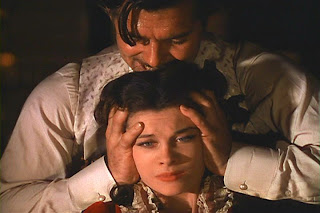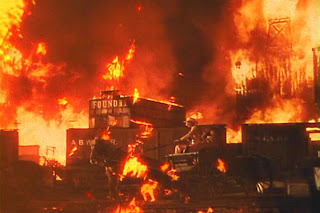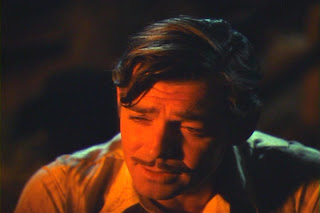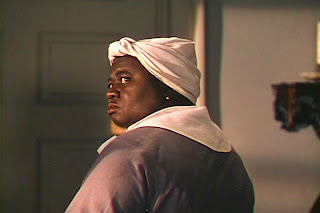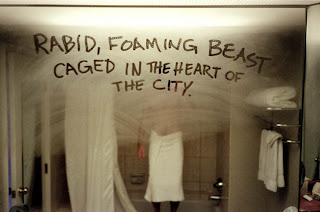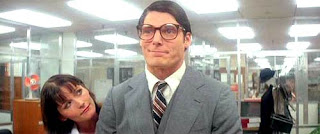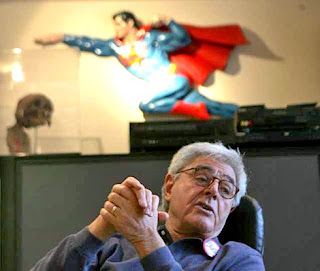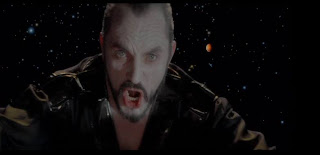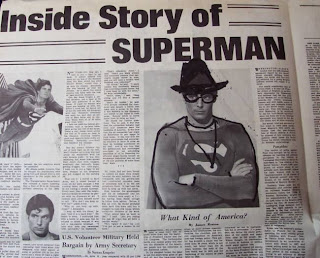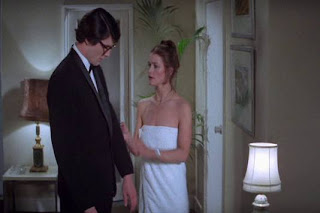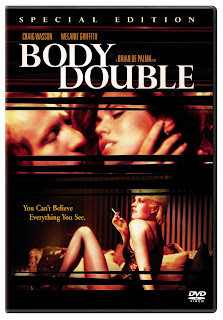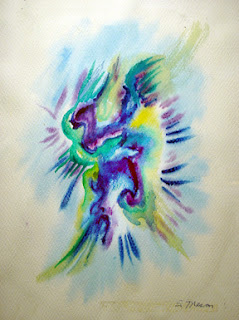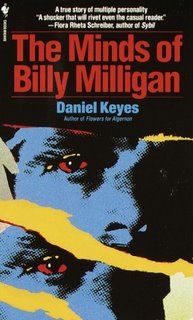
As always, let us start with praise.
Did you guys notice how Mr. Cameron connected the opening and closing shots in his script? As I’m sure all of you know, the opening shot of a movie sets up what that movie is about as well as the expectation of what is to come, and in good movies, the first shot and the last are usually connected in some way. Here, we open with an animated “Rotoscope” sequence involving art, which is quite significant in Billy’s life. The sequence highlights very specific images relevant to Billy’s story – the small girl clutching the rag doll (who we will later learn is Christene, one of Billy’s many “selves”); the rag doll later hangs by a noose, symbolizing the death of an innocent childhood; behind her, a male figure with a black moustache cradles her (who we will later learn is Ragen, “The Protector,” another one of Billy’s 23 personalities); there’s the farmhouse, the leafless trees with spiky tentacles, and of course, Billy’s “heart of darkness,” the corn crib. This sequence sets up a lot of what is to come, the almost fragmented, trippy, episodic events of his life that would shape his adulthood.
And then we get a contrast in the animated sequence at the end with Billy in the Lima State Hospital painting on the white walls of his room “a lush, green landscape.” Then we see Billy IN the animation -- “just Billy, enveloped in this peaceful, green Eden -- painting himself out of Hell and into a world of escape.” First, we're given his nightmares and repression and in the end, his desire to escape.
Billy’s a fascinating individual to say the least, and I completely understand why anyone would want to explore his life for a story. When I first read this script a couple of years ago, I remember thinking, “My goodness, that’s an awfully long flashback of Billy’s childhood.” This time around, it occurred to me that this was, in fact, intended to be a flashback structure, a la the Titanic. In this case, we open with the Act II climax, flashback to see all the events that lead up to that climax (thereby coming full circle back to where we started), and then move into the Act III resolution. While this type of structure worked very well for the Titanic and perhaps others like Double Indemnity and Amadeus, I do question its use here.
We are shown in the opening scenes our protagonist raping those poor, innocent girls. The rest of the script is spent giving Billy’s defense, showing us his troubled childhood and young adulthood and all of the major events that led up to those horrible moments. It was all masterfully written, but emotionally, the piece felt oddly cold to me. I felt cold toward Billy from the very beginning because of those rapes. I was slow to warm up to him or sympathize even when I was sitting through his terrible childhood. When Billy was in that jail cell and he ripped the toilet out of the wall and hurled it at the guards, I felt more like an impartial observer than I did an emotionally invested movie-goer. Even toward the end, I kept myself emotionally distanced from Billy because of those rapes.
Am I a cold-hearted bastard or is this perhaps a flaw in the structure?
It’s a very tall order to show your protagonist raping innocent girls in the beginning and then ask the audience to sympathize by showing his life’s story. I think most audiences could be sympathetic toward a troubled character if he was only robbing people or even if he murdered bad people, but will they feel that way after seeing him rape innocent girls? I don’t know. It could be said, too, that to explore how you feel about this character and his problems and what he did is the whole point of the movie. You could also argue that we’re experiencing his story as everyone else experienced Billy Milligan in the ‘70s. True, but I still can’t help but wonder if there might be a better approach.
Would it not be better to tell this kind of story very simply in chronological order beginning with his childhood? We might feel more involved by experiencing his childhood first as if it was taking place NOW as opposed to seeing events that took place IN THE PAST through flashback. And at least Billy would earn some sympathy before we see him raping girls. And we would have a better understanding why that was happening, too. Would it not also be better, when we actually get to the Act II climax, to have the audience saying to themselves, “Don’t do it, Billy. Don’t do it,” as opposed to the shock of seeing him do it in the very beginning without any regret or remorse? To be more straightforward in the narrative might make the tone of those rapes different, perhaps giving it an air of tragedy, as if to say that this is the lowest low in his life, this is the breaking point, this is the inevitable result of his troubled childhood and severe mental illness.
Okay, the ending. I think Mr. Cameron did as well as he could (perhaps even above and beyond) with the material he had. However, I think Billy’s story makes for a problematic narrative because of the rapes and an even more problematic ending because he never fully recovered. We never saw Billy become whole as one individual. With Sybil, at least we were given that emotional scene in the park where she met and embraced for the first time her other selves. You knew her road to recovery would still be long and difficult but you felt emotionally satisfied that she would recover fully. And, indeed, she did. You don’t really get that with Billy in this story. Here, there was TALK about Billy having met his other selves, about his marked improvement, which we never really saw. I never felt he became whole enough that, if I met him on the street, I could trust him. Indeed, in the closing animation sequence, we’re given a picture of him STILL TRYING TO ESCAPE, not a scene that made us feel, as we did with Sybil, that he would eventually become whole.
There was also talk about him starting a Foundation Against Child Abuse, which we never saw, nor did we get the impression he truly cared about helping others. In a story like this, you typically read about how this kind of person devoted his life to helping others (usually motivated by guilt over his past), but you don’t get that with Billy. Now, he owns a small movie company, Stormy Life Productions. In the script, he never apologized nor tried to compensate the poor girls he violated so horribly. And let me be clear. I don't think these are flaws in Cameron's ability to tell a story, but they may be legitimate cracks in BILLY'S STORY that fatally wounds a big screen adaptation.
Billy’s criminal behavior after this story, even as recent as 1996, almost ruins the chance to have a feature film made. It was reported in the Associated Press that Billy was found incompetent to manage his own affairs and that Billy's OWN court-appointed attorney, Gretchen von Helms, said he “allegedly referred to strapping explosives to his chest to get attention” and “talked about banging on a judge's door and robbing a bank.” That's scary, is it not? Why should audiences care if he’s behaving this way 20 years after this story took place?
Billy Milligan is a genuinely fascinating individual, no question about it. I do feel for him. I think this would make for an interesting HBO documentary or even a docu-drama on TV, but a feature film on the big screen distributed around the world? I’d have to pass, I’m so sorry to say. His story’s not over yet. He still needs to recover. And I also think he might find happiness in his life if he just gave away to those who have also been abused the kind of love that he never received.
Back to James Cameron's A Crowded Room.
